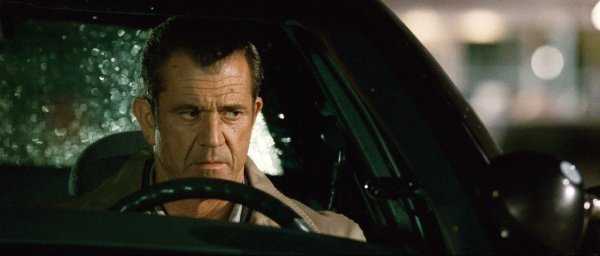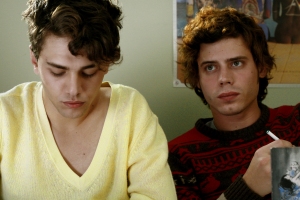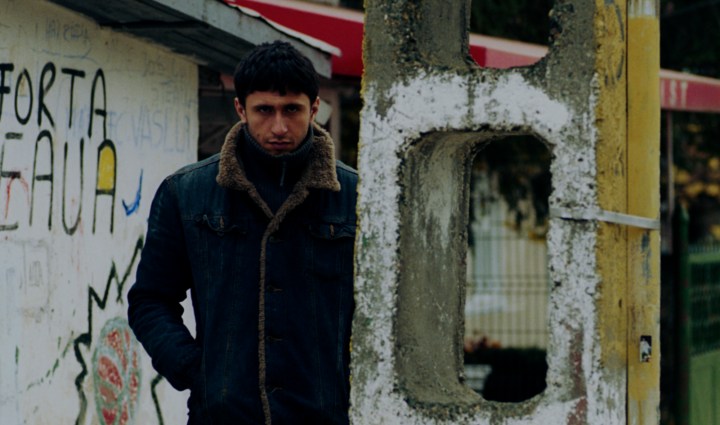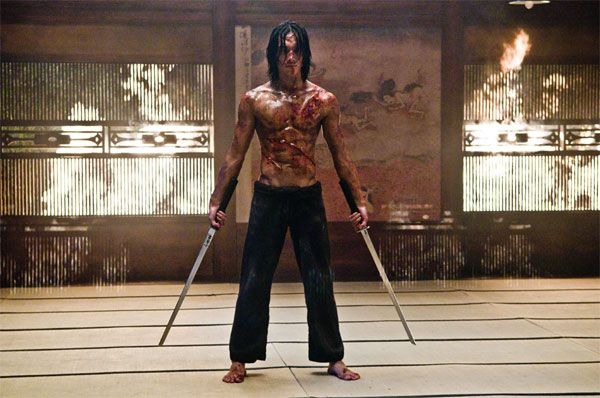Films Reviewed: The Lovely Bones, Edge of Darkness, The Book of Eli
Crummy movies. And there are quite a few.

Let’s start with The Lovely Bones, based on the novel by Alice Sebold, and directed by Peter Jackson, who did the Lord of the Rings.
Little Susie Salmon is an innocent teenaged girl with a happy family, a loving dad who puts ships into glass bottles, a boy she likes, and a shopping mall to hang out at. But one day she’s brutally murdered in a cornfield on the way home from high school. She’s caught in some limbo where she can see her family falling apart and the evil murderer getting away with it. Her sister and father try to catch the killer and stop their family troubles as Susie tries to come to terms with her own death.
This sounds like it could be a really good adventure/thriller, with unusual supernatural elements, and a poignant story. But it wasn’t. It was gross! And uncomfortable, and tacky, if a movie can be tacky. Just the whole look of the movie was unintentionally wrong, especially the otherwordly, limbo scenes. Are we supposed to feel attached to a fake tree suddenly losing all its CGI leaves? Who cares?
The whole movie felt like an out-take from Ghost Whisperer — “Step into the light…Come to the light…” “Not before I tell them my secret!” — but without Jennifer Love Hewitt to provide some link between the two sides.
On the plus side, the thriller scenes were great, with the evil and scary murderer in a race with Susie’s relatives – who feel driven to avenge her death and catch her killer. And some of the acting was also fun, especially Susan Sarandon as a hilariously flamboyant, alcoholic grandmother, who exalts in puffing cigarettes and sweeping metaphoric dust under the rug; and an almost unrecognizeable Stanley Tucci as the creepy neighbour, Mr Harvey. But on the whole, this movie doesn’t work. If you want to see a great movie by Peter Jackson, look for one from his early New Zealand days, Heavenly Creatures, the polar opposite of The Lovely Bones.
And this shows you that just because a movie’s been adapted from a novel doesn’t mean a it’s good.

Opening tonight, there’s Edge of Darkness, a thriller vengeance movie, directed by another kiwi, Martin Campbell, and starring Mel Gibson.
Craven (played by Gibson) is a Boston police detective whose daughter is killed on his doorstop just before she has a chance to tell him something important. Torn apart by grief, and haunted by hallucinations of his daughter who talks to him, he vows to find her killer or killers and make them pay. And he knows his fellow cops in Boston will watch his back.
But he soon finds himself in the middle of something involving his daughter’s shady employers, Northmoor. (the movie keeps many of the names from the old BBC miniseries from which this was adapted) There is some hint of corporate malfeasance, scared whistle blowers, and homeland security spooks. Everyone is lying or too scared to tell him the truth, and people keep getting shot and run down, just before he finds out the secrets. And Jedburgh, a heavy-set English spy, is keeping his eye on things from the margins.
There are some really great scenes of revelations, plot turns, confrontations, and some good chases and escape scenes. The problem is the movie doesn’t sustain it. So you’ll be on the edge of your seat, and then it’ll settle in for some long boring parts again. Mel Gibson plays the psychotic, angry father scenes pretty well, they’re fun, but he falls into awful overacting. In fact there’s a lot of that – there’s a death scene (one of many) that’s like in a sketch comedy that takes ten slow falls and gaspings and near deaths, (just die!) before one character finally exhales its last breath. And an exhausted Mel stumbling up a staircase in a shootout had the whole house laughing – except… it was a serious scene. Oops. The movie also had some interesting if unintentional twists, where there’s a Republican Massachusetts senator in the movie (even though the surprise midterm election was just last week) and crucial information is passed to an investigative journalist – from Fox News?
But the complicated conspiracy plot is so nebulous and twisted it isn’t even worth pondering its implications.
Finally, there’s The Book of Eli, a post-apocalyptic action drama directed by the Hughes brothers.
Eli (played by Denzel Washington) is a hobo living in a destroyed America, traveling on a highway toward the west coast with a heavy bible-looking book. He eats whatever he finds and defends himself from strangers. Water, not food, is the commodity in this world. When he wanders into a western town, he is set upon by illiterate motorcycle gangs. He eventually teams up with Solara, a tough young woman held hostage by a corrupt town boss. In this post-nuclear world, the town boss thinks his literacy is power, and that a copy of the bible will give him absolute power.
On the surface, this seems like a lo-cal version of The Road, with more sword fights and punch outs and chase scenes, and less depressing heaviness, and profundity.
(This movie also borrows heavily from movies like The Road Warrior, the Japanese Zatoichi series, and just about every western ever made.)
And I thought, what a junky piece of Bush-era crap,
where the heroes quote scripture and shoot up everyone they meet in the name of God and America. But when I thought about it a bit more, I liked it a bit more. I think it was better than I first gave it credit. And I think it had a message. (And this won’t give anything away.)
By reclaiming evangelical Christianity after it had become strictly right-wing territory, The Book of Eli lets the baptism of the Rev. Dr. Martin Luther King, Jr. overthrow the corrupt, power-hungry southern whites, as symbolized by false preachers like Gary Oldman (the town boss).
The film rejects the intolerance of fundamentalist “culture wars” and intentionally embraces alternative lifestyles. An old couple they meet on the road are humanized by showing their love of 70’s gay disco records. California, Eli’s ultimate destination, is shown not as a fallen Sodom and Gommorah, but as the new Jerusalem — where, Eli hopes, faith and learning are kept alive despite the near destruction of the world. Hobo preachers spread the word and fight against censorship, while the corrupt false preachers horde their information, emulate Mussolini’s fascism, and use illiterate lackies and blackshirted soldiers to hold on to their power and fuel their dreams of a water-hording empire.
Is it a coincidence that this movie was released on the weekend of Martin Luther King’s birthday? No. The Hughes brothers
are reclaiming the gospel in the name of educated, inclusive, black centrists — led by Barry Obama.
While not a great movie, The Book of Eli is an interesting one.
– Daniel Garber, January 28, 2010
Blurring the Boundaries: Chains vs Indie Rep Cinemas
I like movies and I’m no purist as to what makes a movie. And even if you base it on a 70’s TV show (like the very funny the Brady Bunch Movie), or a kids toy (like the so-so Transformers), or even a video game (like the awful Lara Croft: Tomb Raider) they’re still all movies…more or less.
But while movies change, movie theatres have stayed more or less the same. At least in my lifetime. And one thing I thought was unchanging is that chain movie theatres did one thing, and indie rep cinemas did something else.
Mainstream movie theatres show new, first run, studio movies; rep cinemas show second run movies, or classics. Big theatre chains are a bit pricey, reps are a bit cheaper. Right? Well, it looks like something strange is happening in Toronto, and it’s getting very hard to tell one from the other.
So, in Toronto, The Royal, a rep cinema, is showing first-run European and Asian movies, like Police: Adjective and so is the Bloor, with films like Revanche. First run! And charging premium prices for them. I can live with that. It’s been heading that way for awhile.
But here’s something I’ve never, ever seen before. Now Cineplex is showing a series of old movies, all well known, mainly from the 70’s, 80‘s and 90’s, in early February. And charging 5 bucks a pop. Ok, they’re digital, so they’ll look a bit different (worse, in my opinion), but these are all movies I know from the reps: Close Encounters, The Godfather, The Shining, Die Hard.
What’s going on? Are they allowed to peach old movies, their mainstays, from the reps? Is that fair? Meanwhile, they’re also showing live Operas. I didn’t go to that, but people of my parents generation saw Carmen and loved it — a couple hundred thousand people, all over the world. Which is what people used to do… but they watched live shows on TV, not in movie theatres. And, before you think movie chains are altruistically raising the bar by sponsoring high culture, realize that has nothing to do with it. They’re just trying to find what puts bums in seats. Bums in seats — that’s the motivation. Next in line after the opera? Pro-wrestling.
And the reps are showing live performances, hosting film festivals… so that’s what I mean when I say the borders are blurring.
This is in the movie theatres, but something else is happening, something that I find really hard to fathom. I recommended a movie to some friends, and ran into one of them.
“So? Did you see it?”
“Oh yeah, it took three days, but I finally found it online, and downloaded it. It was in Romanian and it had Chinese subtitles, and it stopped playing after 40 minutes…”
Why can’t people just go to a movie theatre? Isn’t there something to be said for a nice crowded theatre filled with people laughing or hooting just generally enjoying themselves watching it on a big screen? And people are going back to the movies. Maybe it’s because of Avatar — it only takes one big hit to bring the people back — but whatever the reason, I’ve been seeing even second- and third-rate movies selling out. So tear yourselves away from your laptop screens and join the rest of the world, and go see some crummy movies. Come on. They’re fun.
– Daniel Garber, January 28, 2009
Will Ninjas Replace Werewolves? Ninja Assassin and Kamui
Japan and Japanese period movies, usually set in the mid-19th Century, like most westerns, are often reduced to the same clichéd elements: samurai, ronin, yakuza, corrupt nobles, scheming geisha… It’s the ever-changing stories that keep them interesting.
Hollywood westerns also have their stock characters — the black hats and white hats, the saloon keepers, the sheriffs –- that they wheel out before the camera when they need them.
And movies, like anything else, go through fads. We all know that pop movies have gradually shifted popular themes, from zombies to vampires. And lots of people predict that the werewolves are pushing out vampires now.
But what about the Ninjas? Where do they stand? Will they be the next big thing? Maybe.
Ninja Assassin, a mediocre action movie, notable mainly for its ultra-bloody red, black, and white colour scheme, stars a Korean non-actor, the pop star called “Rain” as – what else? – a Ninja Assassin.
Ninja Assassin (in English)
Dir: James McTeigue
The head of a ninja academy kidnaps small children all around the world and transports them to a Himalayan mountain top’s secret hideaway. They grow up as viciously trained ninjas, the almost invisible Japanese spies and killers who wear black, who throw stars and use their swords to chop up whoever they were ordered to kill. They creep in and out like the world’s best spies, nameless, faceless, deadly. But rather than keeping its Japanese theme, this movie universalizes it. The children are of every nationality and the action takes place mainly in Berlin of all places, complete with U-bahn and curry wurst – an unexpected juxtaposition of unrelated cultures.
So it’s only as Japanese as the sliding paper screens on the sets – Ninja’s have reached international status.

Kamui (in Japanese)
Dir: Koichi Sai
Much better than Ninja Assassin is the quite amazing movie Kamui, Directed by Koichi Sai. I hope it will be released in North America this year.
As an ex-shinobi on the run, Kamui, fights a female Ninja to the death when he is still just a little boy. You can never escape the clan. He is an outcast, a hinin, and teaches himself all the secret tricks and almost magical rules of self defense just to stay alive.
14 years later he witnesses a poor fisherman, for unknown reasons, cutting the leg off a corrupt nobleman’s prized horse. Kamui helps him escape and is pulled into the conflict. He has no choice but to follow the fisherman to his boat to escape the attacking troops.
The fisherman takes him to a quaint island where life is peaceful and almost idyllic, but he must always be alert to the Ninja ghosts of his past – the shinobi agents who are sworn to execute any ex-member; and the spoiled and cruel nobleman who wants to punish everyone associated with the death of his horse.
Kamui is an amazingly beautiful and moving adaptation of a Japanese comic and shares its long and complex melodramatic plot, countless faces, and the frequent revelation of characters’ hidden secrets and acts of betrayal.
Fights are done in that old Hongkong movie style where every battle has swordsman jumping high in the air to clash blades. Fighters swing from trees like Tarzan. Although it frequently uses CGIs (computer generated images), something I usually hate, they’re all excellently done.
Watch out for Kamui.
– Daniel Garber, January 10, 2010.
Short reviews of movies now playing: J’ai Tue Ma Mere, Polytechnique, Police: Adjective, Revanche
There are some good movies now playing that you should try to catch. TIFF Cinematheque Ontario, in Toronto, is running a series of good movies this coming week, including the top 10 Canadian movies made last year. Not surprisingly some of the most interesting ones are from Quebec.

J’ai Tue Ma Mere (in French)
Dir Xavier Dolan
If you have the chance, try to catch J’ai Tue ma Mere, (I Killed My Mother) a coming of age comic-drama about a gay teenager and his troubles with his gauche and difficult, but loving mother. Hubert (Xavier Dolan) doesn’t get along with his mother. He’s smart and well-read, but he isn’t doing well in school. He’d rather spend time with his boyfriend Antonin than in his own home. Hubert and his mother, played, perfectly by Anne Dorval, each try to win one another’s affections but things always devolve into shouting fights between mother and son, until he is forced to move out.
It’s a low-budget movie, but really well done, with believable characters, funny lines, interesting story, good acting. And, amazingly, this semi-auto-biographical film was directed and written by the same 19-year-old (Xavier Dolan) who plays the main character. And it’s a good movie, not just because it was directed by a kid.

Polytechnique (In French)
Dir: Denis Villeneuve
Another Quebec film, beautifully done, but not as successful in my eyes, was Polytechnique, (directed by Denis Villeneuve) a fictionalized version of the 1989 massacre of 14 women at Ecole Polytechnique, the engineering school at the University of Montreal. It’s very similar to Elephant, Gus Van Sant’s great movie Elephant (from 2003), about the killings at Columbine, but Polytechnique was shot in black and white. It is an upsetting and moving period drama of that horrible massacre, in which a crazed gunman shot as many women as he could because they were “feminists”. Which brings me to my beef with this movie.
Like so many other movies, this one feels like it just can’t bare to tell a story through the point of view of a woman. The director gives us the killer’s private thoughts (Maxim Gaudette) as well as some of the victims (in other words, all of the women – but especially Valerie played by Karine Vannasse) but then feels obliged to create a heroic male counterpart to the villain (Sebastien Huberdeaux). So we get something that feels a bit like the old silent movies where a Dudley Do-right rides in to try to rescue the Damsel in Distress from the bad guy. Since it’s a made-up dramatization, would it have been so difficult to make the fictional, tragic hero a woman instead of a man? Especially in a movie about a massacre of women killed for daring to be the equals of men.
Anyway, as I said it’s beautifully shot movie, black and white, set in a wintery Montreal. It’s visually great, and (except for my problem with the film itself) is a good telling of this tragedy.
Also opening very soon are two European movies, one from Romania and one from Austria, both good.

Police: Adjective (in Romanian)
Dir: Corneliu Porumboiu
This movie is about a cop, Cristi, living in a modern, small city in present-day Romania, where people have the trappings of western Europe and modernity, but with the pedantic, rule obsessed absurdity of the communist Ceausescu still strong.
Cristi is asked to launch a sting operation on a high school kid who smokes pot with his friends. Cristi doesn’t think it’s fair so refuses to do so, but is pressured by his boss. His tension at the absurdity of the issue continues in his apartment as he tries to understand the reasoning behind it. His wife/girlfriend, a school teacher, doesn’t help with her own obsession with an awful Eurovision-type song that she tries to analyse (in one of the funniest scenes in the movie.)
This is a very slow-paced “art” film, but I enjoyed it’s off-beat sensibility in its realistic-seeming (at times, maybe, too realistic) depiction of daily life in Romania. Don’t see it expecting another 4 Months, 3 Weeks, and 2 Days (a drama about a Ceausescu-era woman trying to get an illegal abortion). It doesn’t have the narrative drive and tension of that great movie. But it is still very good.

Revanche (in German)
Dir: Gotz Spielmann
Alex a strong ex-con and his beautiful Ukrainian girlfriend Tamara both work at a brothel, Irina in a bedroom, Alex moving boxes in the basement. They sneak away for athletic love-making in his apartment as she tries to teach him Ukrainian. They want to escape the sleazy life of Vienna’s demi-monde and head somewhere warm away from her increasingly sketchy pimp. But they need money,
Alex comes up with a foolproof plan to hold up a bank not far from his estranged grandfather’s country homestead. But things don’t go as planned when a wimpy local cop happens upon the robbery. Alex is forced to hide out at his grandfather’s home. Tension grows as he contemplates revenge – hence the title – and chops away, violently, at a pile of firewood…
This is a great movie that I saw at the Toronto International Film Festival over two years ago but still remember very clearly. When a film resonates for so long it’s a good sign that it’s worth seeing. This is an excellent, moving film, beautifully shot. Alex (Johannes Krisch) and his grandfather (Johannes Thanheiser) are especially good.
– Daniel Garber, January 13, 2009
Post-Apocalypse Now: Movie Reviews — The Road, Collapse, Daybreakers
 Around this time of year, when it starts to get bitterly cold, when the skies are overcast, with no hint of the sun some days, and no holiday coming for a long, long time… well this is the time of year when people start thinking of disaster, apocalypse and general destruction.
Around this time of year, when it starts to get bitterly cold, when the skies are overcast, with no hint of the sun some days, and no holiday coming for a long, long time… well this is the time of year when people start thinking of disaster, apocalypse and general destruction.
Canada’s Parliament seems to close down, without rhyme or reason.
A tsunami in the Indian Ocean, levees collapsing in New Orleans, a horrendous earthquake flattening Porte au Prince.
People’s thoughts turn to apocalypse.
Canadian writer Douglas Coupland’s new novel “Generation A” tells of a disastrous future world where technology progresses, like it always has, but the bees… the bees… are… gone.
OK, not so scary, but he imagines a world where our ecosystem has been totally decimated and 5 youngish people in five countries get stung at once by five bees which had somehow survived their extinction. An entertaining book.
Then there’s the movie
The Road
Dir: John Hillcoat
Based on the novel by Cormac McCarthy
If you haven’t seen it yet, it’s still playing on the big screen and you should try to catch it, and be depressed.
A man (Viggo Mortensen) and a boy (Kodi Smit-McPhee) who have survived a monumental disaster (that seems to have killed everything on earth, except for some humans), are on the road slowly walking south in some future incarnation of the United States. The boy is one of the few people born into this post-apocalyptic world. This place is now inhabited not by zombies, robots, or aliens but by the scariest monsters of all: ordinary people who have lost any sense of decency or morality. These survivors live only to eat whatever food they can find or steal, mainly canned goods put aside by long-dead “survivalists”. Or, rumours have it, they eat other people.
The movie is full of religious symbolism. The boy is portrayed as an almost messianic icon, gentle as a lamb, innocent, moral, and forgiving. Scenes of death and rebirth, quasi-baptismal rituals, floors strewn with now worthless dollars and jewels, and locations in crumbling churches, give the harrowing film a decidedly Christian motif. Can the characters hold onto their civilization and beliefs (what the father and son call “the flame inside”) where humanity has ceased to exist?
Australian John Hillcoat also directed the beautifully shot and extremely violent movie, The Proposition, which failed where The Road succeeded so well. Where that movie had red, wide shots of the Australian outback, The Road has stark, arresting desolate landscapes of dead forests, abandoned, half-finished bridges, collapsing ghost towns, with garbage blowing instead of tumbleweeds. The movie feels like the cast has been transplanted into photos by Burtinsky.
This is a pretty depressing theme for a movie, but it’s not necessarily a downer. Anyway, if you haven’t seen it maybe you should check it out.

Collapse
Dir: Chris Smith
Collapse, a documentary, is a chance for a political theorist, Michael Ruppert, to voice his views of what’s going on in the world. To summarize: we’re doomed. The world’s energy supply has long since passed “peak oil” – the point at which oil is being produced at the highest level before its decline; he predicted the current burst bubble economy in his dissident newsletters – and it’s not going to get better; and the powers that be, including the CIA, are nefarious drug-dealing thugs. The entire movie consists of him in close as he riffs in an excellent ongoing monologue on various topics as he chain smokes.
This movie combines what look to me like the styles of two great filmmakers, Errol Morris (especially in his amazing TV interview show, First person, where he talked to people like the autistic Temple Grandin), with his long takes of a single subject waxing lyrical in a bare room; and Adam Curtis, a British documentary maker for the BBC, who’s style, like this one, combines the monolgue voice style with visually pleasant old-school documentary stock footage. So in this movie there are long sequences where Ruppert’s ideas on energy are amazingly well illustrated using old educational films dating back to the 1970’s energy crisis.
Ruppert is an ex-LAPD cop, who talks like a small-town American and looks, disturbingly, like Doctor Phil (the TV psychiatrist). And most of what he says in the film is completely plausible, with parts that are already proven. When he gets to his own personal story – that his own ex-girlfriend worked for the CIA when they tried to get him to help smuggle drugs into LA when he was a cop… and how they pursued him and smashed up his office when he published a controversial newsletter in which he used his own news research to expose various government cover-ups – he verges on, but doesn’t quite reach – paranoid sounding. Is he? Or isn’t he?
The filmmaker, Chris Smith, intentionally makes him seem edgy as he tells his story, but also gives him the chance to state all of his very convincing theories. It’s up to the viewer to decide what to believe and what to discount, but, either way, Ruppert’s a captivating speaker, and it’s the kind of movie you talk about with strangers in the lobby as you leave, as you try to think through the Truckload of information he dumps on you.
 Daybreakers
Daybreakers
Dir: Michael and Peter Spierig
Another view of the post-apocolyptic future comes in the form of a new vampire movie, Daybreakers, directed and written by brothers Michael and Peter Spierig. Vampires roam the planet feeding on humans, and changing some of siring them into vampire-dom. At some future point, the vampires overtook humans in total numbers, and basically tool over, living in the same homes, taing the same subways, working in the same offices. Humans are driven underground – metaphorically speaking, since they, unlike vampires, can exist in sunlight without bursting into flames – and are hunted by police and military who function as corporate entities, like the ones in Paul Verhoeven’s classic film “Robocop”. So, while Ruppert, in collapse, talks about peak oil, this movie begins at some point after “peak blood” – the demand has way outstripped supply, so the vampires — who look just like humans except they have two little cutely pointed teeth and amber-coloured eyes – are desperately chasing down the last humans for their blood, and at the same time are trying to create an adequate
blood-substitiute.
So that’s the set-up for the movie. Ethan Hawke is the heroic blood research scientist trying to find the cure, Sam Neill is his boss, the sinister CEO; and Willem Dafoe is one of the rebel humans trying to stay alive. Is it a good movie? I didn’t like it as much as a lot of people I know, mainly because it was more cheesy than scary – with lots of really cheap effects like bats flying at the screen every so often. I guess it’s supposed to make you scream. It didn’t. Still, the story was fun enough to watch, entertaining enough, and different enough… if you’re really into vampires. It has some very gross, bloody scenes, but it’s not too gory, at least not by current standards.
– Daniel Garber, January 13, 2010


1 comment